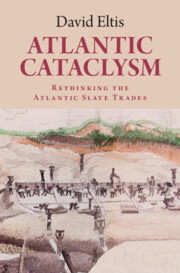
- Publisher:
- Cambridge University Press
- Online publication date:
- December 2024
- Print publication year:
- 2025
- Online ISBN:
- 9781009518963
- Subjects:
- History, Global History

In this comprehensive work, David Eltis offers a two-thousand-year perspective on the trafficking of people, and boldly intervenes in the expansive discussions about slavery in the last half-century. Using new and underexplored data made available by slavevoyages.org, Eltis offers compelling explanations of why the slave trades began and why they ended, and in the process debunks long-held assumptions, including how bilateral rather than triangular voyages were the norm, and how the Portuguese rather than the British were the leading slave traders. Eltis argues that two-thirds of all enslaved people ended up in the Iberian Americas, where exports were most valuable throughout the slave trade era, and not in the Caribbean or the US. Tracing the mass involvement of people in the slave trade business from all parts of the Atlantic World, Eltis also examines the agency of Africans and their experiences in the aftermath of liberation.
‘A tour de force by the world’s leading scholar of the slave trade. Atlantic Cataclysm challenges virtually every popular assumption about the transatlantic slave trade and its consequences for Atlantic and global history. David Eltis has demonstrated in stunningly brilliant detail the indispensable value of deep archival research and big databases for documenting the largest forced migration in human history, and for the important insights these data can yield. Drawing upon a deeply learned and truly commanding comparative approach, Eltis has written the definitive analysis of the slave trade in Africans to the New World.’
Henry Louis Gates, Jr - Harvard University
‘A masterful account by the doyen of the field. Eltis convincingly locates the Americas at the center of a world-changing ‘Atlantic Cataclysm’ and, in so doing, radically transforms our understanding of the trans-Atlantic slave trade's history.’
Nicholas Radburn - Lancaster University, and author of Traders in Men: Merchants and the Transformation of the Transatlantic Slave Trade
‘The product of more than thirty years of research, David Eltis has produced a provocative and carefully argued set of findings on the slave trade using new data and reinterpreting older material. It will likely be the starting point for future discussion of the nature and impact of the trade on Africa, the Americas and Europe.’
John Thornton - Boston University
 Loading metrics...
Loading metrics...
* Views captured on Cambridge Core between #date#. This data will be updated every 24 hours.
Usage data cannot currently be displayed.